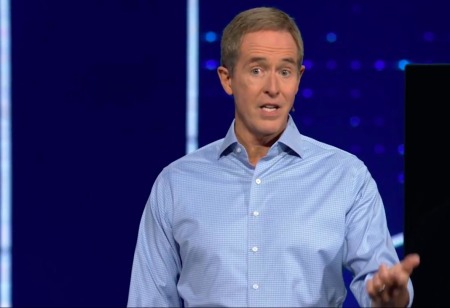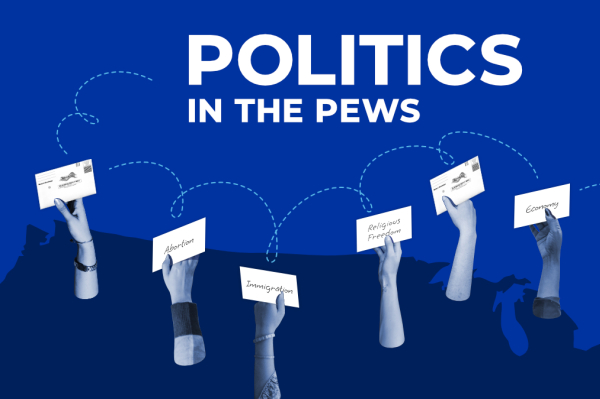Andy Stanley on 5 questions Christians should ask before making a decision

Megachurch pastor Andy Stanley has identified the five questions he believes every Christian should integrate into their decision-making process to find success in all areas of life.
During an interview with Sean Morgan, vice president of Leadership Capital, Stanley, founder of the Atlanta-based North Point Ministries, explained that as a pastor, it “breaks” his heart “watching people make decisions that undermine their own success, their own marriage, their own finances, their own relationship with their kids.”
“There's enough headwind in life. There's enough negative force. The last thing we need to do is to facilitate our own demise,” he said. “There is a super important connection between the questions we ask and the decisions we make. The better the questions, generally, the better decisions.”
Stanley, who recently released his latest book Better Decisions, Fewer Regrets, identified the five questions he believes every Christian should add to their “decision-making filter,” adding: “If you'll ask these five questions and if you'll answer them honestly, I guarantee you, you will make better decisions, and consequently, you'll live with fewer regrets.”
First, people should ask themselves, “Why am I doing this?”
“You’ve got to be honest with yourself,” Stanley stressed. ”We are all experts at lying to ourselves ... until we're honest with ourselves, we can't lead ourselves well. And if we can't lead ourselves well, that always catches up with us in our public leadership as well.”
Second, it’s important to ask, “What story do I want to tell?” — in other words, think “ultimate rather than immediate.”
“When we think about decision-making, we have a tendency to think of each decision in isolation from the other decisions, but every single decision may become a permanent part of the story of your life, and eventually this segment of time, this decision is not going to be anything other than a story,” Stanley said.
Third, he advised asking, “Is there a tension that deserves my attention?”
“As we're getting closer to actually making the decision, [there may be something] on the inside that's bothering us and we can't put our finger on it,” he explained. “There's a tendency to brush by or to ignore that ... but don't brush by it. Allow it to bother you. Let it become so front and center ... If we allow that tension to grow, eventually, it begins to make sense. There’s new information, and there's new insight and there's clarity.”
The fourth question believers should ask is: “What is the wise thing to do?”
“Not ‘what is the right thing to do?’” Stanley clarified. “Your greatest regret is generally preceded by a series of unwise decisions. A lack of wisdom is what brings us to the precipice of the decision we wish we could go back and unmake.”
“In light of my past experience, what is the wise thing for me to do? In light of my current circumstances and state of mind, what is the wise thing for me to do? In light of my future hopes and dreams, what is the wise thing for me to do?”
Finally, the pastor encouraged people to ask themselves, “What does love require of me?”
“When I talk about love in this context, it's not just cultural love,” he said. ”It's the love Jesus talked about when He said, ‘A new command I give you: Love one another, but don't stop there. Love as I have loved you.’”
“As Christians ... those are our marching orders that shape and define and create and inform our conscience in terms of what our behavior should be,” Stanley said. “So when you're not sure what to say or do, you stop and ask what love requires of you.”
According to Stanley, most people don't learn from bad decisions because they're convinced their bad decisions were somebody else's fault.
“Our culture tells us that the worst thing we can do is to feel bad about ourselves. That is not true,” he emphasized. “The worst thing we can do is not feel bad about ourselves about something that's bad about ourselves.”
“Shame has its place and shame has its role, and if I'm not willing to face where I actually am, I will never ever get to where I want to be,” he added. “So as long as I'm kidding myself, as long as I'm selling myself, as long as I'm fooling myself, as long as I'm refusing to look in the mirror and make excuses, there's just no way to make progress, whether it's financially, professionally, academically, relationally and whatever it might be.”
He pointed out that humans are “really good” at “selling ourselves on a really bad idea” and stressed the importance of not rushing into making decisions.
“We don't want to wait,” he argued. “We know that if we wait, we're going to talk ourselves out of it and so we become our own worst enemies.
“These principles are so important and so foundational, and they’re for everybody.”





















